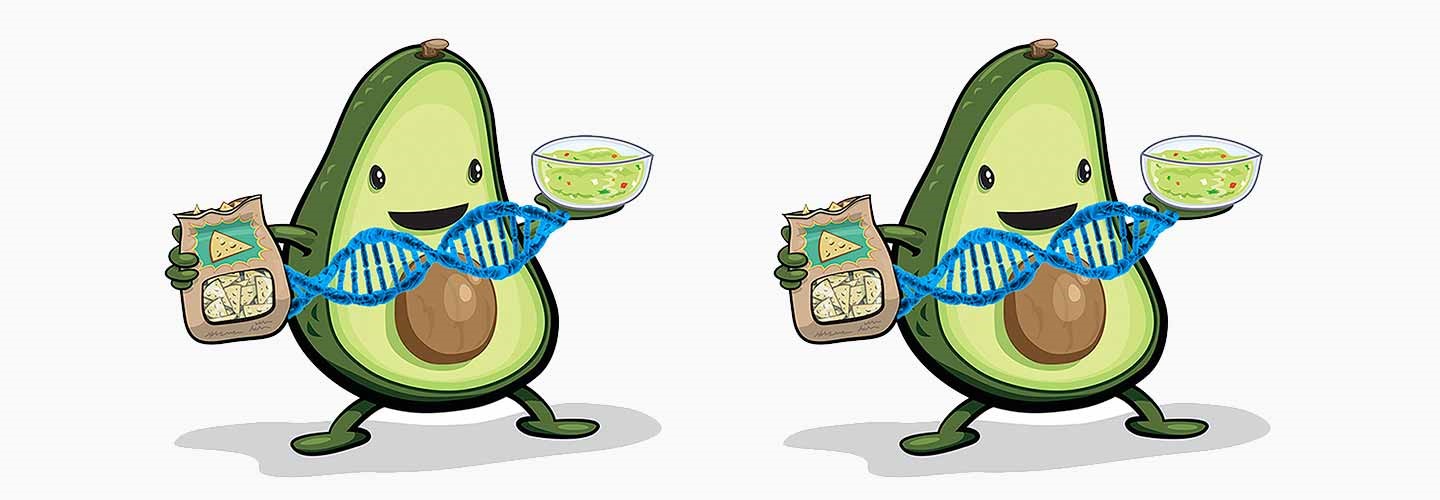Holy Guacamole! The MTHFR Gene and the Avocado Shortage
- Home
- Blog

Reader, the media has generated a lot of speculation recently about the potential consequences of building a wall between the US and Mexico. In the last few weeks, President Trump has even considered shutting down the entire border between the two countries. One consequence has garnered intense bipartisan concern, and may even reach a crisis level: the possible impact a border shutdown would have on this country’s love of (of all things) avocado! In the last decade, Americans’ consumption of avocados, and subsequently its delicious biproduct, guacamole, has increased drastically. As such, some estimates have projected that guacamole supplies could run out in less than a month after shutting down the supply line. Now, I’m not here to jump into the political battle that surrounds the debate over the wall or the shutdown. Instead, I want to offer you some food for thought on how this potential supply chain issue is eerily similar to the physiological limitations that certain genetic variations can cause in our body.
Supply chain constraints on the avocado market would inevitably lead to critical scarcity in the guacamole market. Now, those with a particular passion for guacamole may argue this delicious food is essential to feel well. While we might empathize with their passion, today, we’re going to talk about a few mood-regulating chemicals that are truly essential—yet very much reliant on your body’s supply chain to show up and make an impact. Serotonin, norepinephrine, and dopamine are known as the “feel good” chemicals that stabilize your mood, are responsible for your joy, and promote general feelings of wellbeing and contentment. But, like guacamole, these chemicals are reliant on a critical “ingredient” in order to be produced and reproduced. The gene fundamental to their production line is called Methylenetetrahydrofolate reductase (MTHFR). I am excited to welcome back my child and adolescent psychiatrist colleague at Potomac Psychiatry, Mark A Novitsky Jr. MD, to share with you more information about MTHFR and how it is essential for wellness—especially in children!
Why MTHFR Production May Hold the Key to Your Child’s Happiness
The production of MTHFR plays a critical role for a child’s wellness—and abnormalities can cause negative consequences both physically and mentally. This gene codes for an enzyme that converts Folic Acid/Folate (a B vitamin) into the active form, L-Methylfolate. L-Methylfolate is then used as a cofactor for the production of the neurotransmitters serotonin, norepinephrine, and dopamine.
Many individuals in the population may have one or more genetic variants of MTHFR, so having a variant doesn’t necessarily mean that you will have clinical consequences. However, as an individual has more variant genes, the consequences add up and the likelihood of neurotransmitter production constraints increases. Like a wall or border shutdown blocking avocados entering the US, these variants limit the availability of L-methylfolate in the body. Similar to the effect of a limited supply of avocados on the guacamole market, an underproduction of l-methylfolate results in a deficiency of serotonin, norepinephrine, and dopamine—ultimately resulting in anxiety, depression, memory issues, inattention, hyperactivity, and impulsivity.
For this reason, when a child comes to me for psychiatric treatment, I recommend that we do genetic testing to give us an idea of a child’s baseline genetic supply lines. As I shared previously in Dr. Kehr’s blog series, genetic testing has helped me to limit the number of medications that I have prescribed—often through optimizing MTHFR.
The Benefits of MTHFR Genetic Testing: Mood Elevation, Reduced Anxiety, and More
Traditionally, psychiatry has “medicated” a child’s underproduction of Serotonin through the prescription of SSRI antidepressants (Selective Serotonin Reuptake Inhibitors such as Prozac, Lexapro, Zoloft, Celexa, Paxil, etc.) and the underproduction of Norepinephrine with SNRIs (i.e. Cymbalta and Effexor) in hopes of elevating mood and mitigating anxiety. These medications, while necessary in many cases, do carry an FDA black box warning for increased suicidality with youth, so if there is a way to avoid having to use them—or to limit the dosage needed—I pursue that path first. Similarly, the ADHD stimulant medications (i.e. Adderall and non-stimulant ADHD medication Strattera) have traditionally been used to account for the underproduction of dopamine but often lead to decreased appetite, insomnia, and irritability after the medication wears off.
In certain cases, if the genetic variants (sometimes called genetic mutations) are significant enough, I compensate for the body’s inability to generate enough L-Methylfolate and encourage families to first consider supplementing with L-Methylfolate rather than the traditional vitamin Folic Acid, which the child’s body cannot adequately utilize. This enables the production line to maximize the production of serotonin, norepinephrine, and dopamine. There have been several cases where a child’s anxiety, mood, and focus have seen improvements with this intervention alone, obviating the need for prescription medication altogether.
For others, by increasing production of neurotransmitters, it allows medication interventions to be more effective. For example, in the case of using an SSRI in a depressed child (assuming the SLC6A4 gene recommends use of an SSRI in a depressed child), the increased production of Serotonin results in an increased amount of serotonin in the presynaptic neuron (brain cell). The presynaptic brain cell releases serotonin with a goal of it reaching the second neuron, the post synaptic neuron to “feel” the effect of serotonin. The body is pretty good at cleaning up after itself, so the presynaptic neuron takes back (“reuptakes”) any unused serotonin. SSRI antidepressants work by blocking this reuptake, thereby allowing the serotonin more of a chance of getting to the ultimate target.
Increasing the arsenal of serotonin through MTHFR allows for more serotonin to be en-route to the target to elevate mood and reduce anxiety, and thus allows for the SSRI to be more effective even at lower doses (thereby limiting the risk of unwanted side-effects). The same can be said for dopamine and limiting stimulant doses.
Long story short, we don’t need for genetic obstructions to limit production if we are aware of the work-arounds. Now if only we could figure out a solution for the potential avocado shortage! My Chipotle Burrito bowl just won’t be the same without that generous heap of guacamole…
Related Information
- Learn about Genetic Testing
- Learn about Potomac Psychiatry
- Meet Our Doctors
- Contact Potomac Psychiatry
.png?width=144&height=144&name=Untitled%20design%20(34).png)



